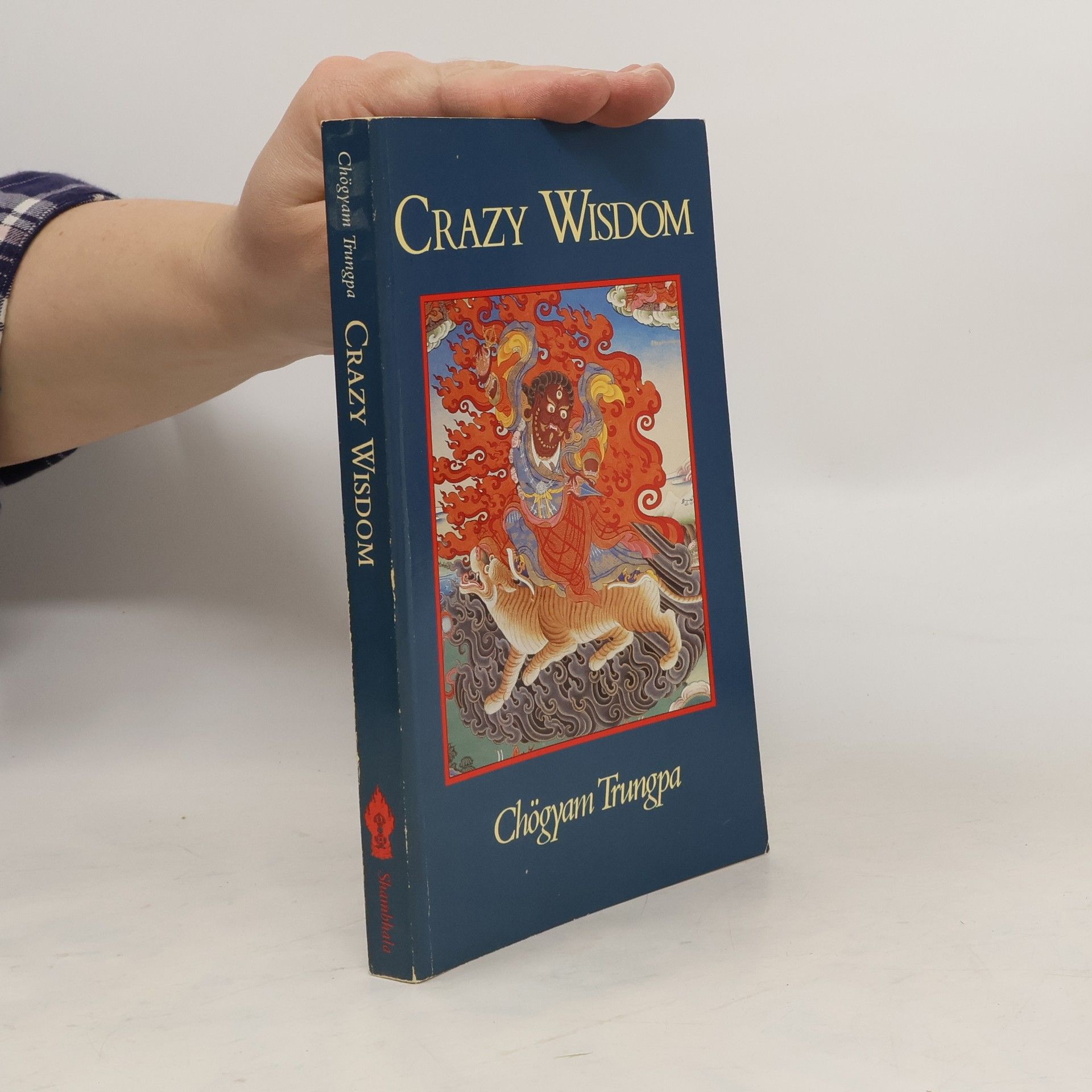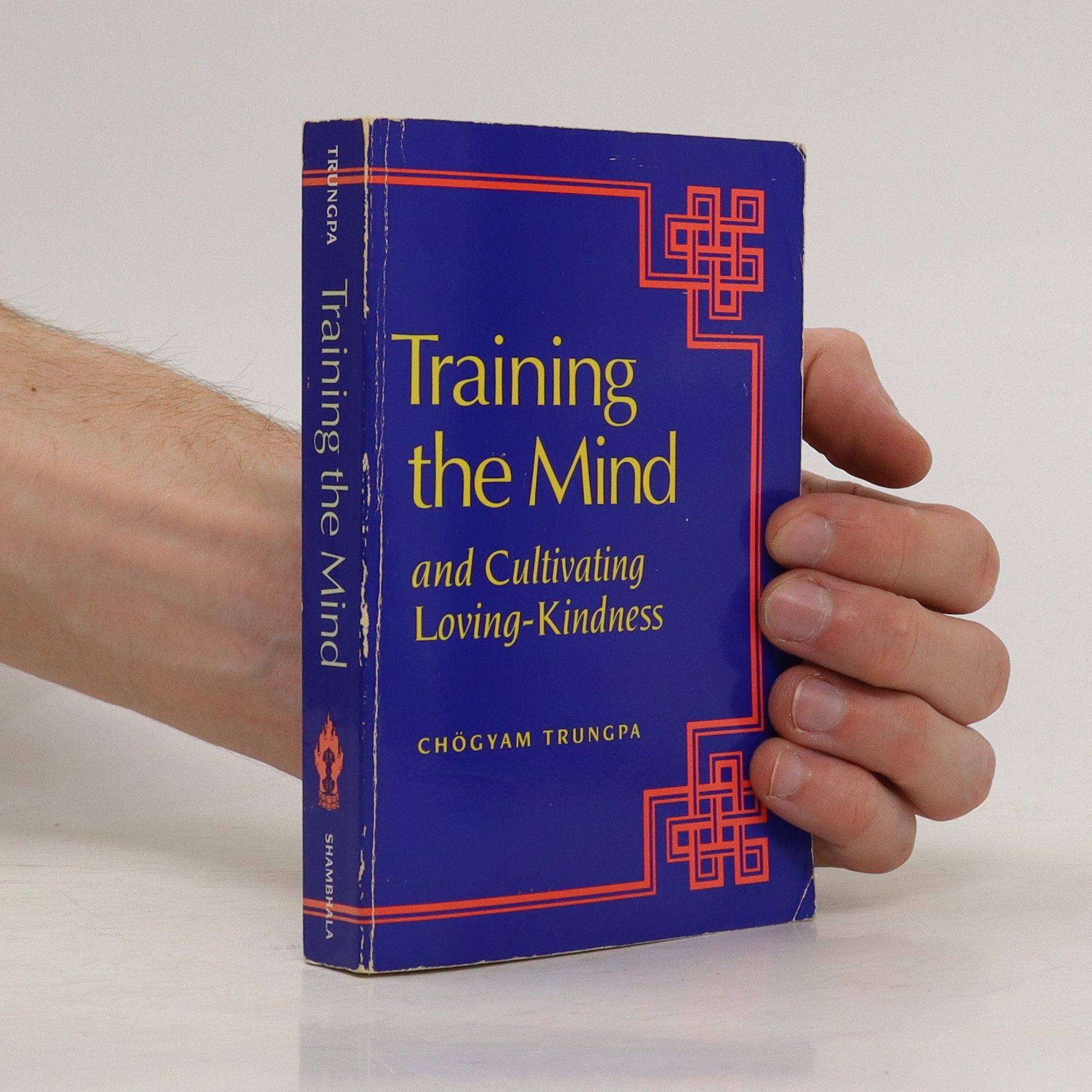Presents the bodhisattva teachings of the mahayana. Mahayana practitioners dedicate themselves to the service of all sentient beings, aspiring to save them from sorrow and confusion, and vowing to bring them to perfect liberation. This stage of the path emphasizes the cultivation of wisdom through the view and experience of emptiness, or shunyata, in which all phenomena are seen to be unbounded, completely open, ungraspable, and profound. From the ground of shunyata, compassionate activity is said to arise naturally and spontaneously. In addition to mindfulness and awareness, the mahayanist practices lojong, or "mind training," based on the cultivation of the paramitas, or "transcendent virtues": generosity, discipline, patience, exertion, meditation, and prajna, or "knowledge." As a component of lojong, tonglen, or "sending and taking," is practiced in order to increase maitri, or loving-kindness
Čhögjam Trungpa Libros
Vidyadhara Chögyam Trungpa Rinpoche fue un maestro de meditación budista, erudito, poeta y artista que desempeñó un papel fundamental en la difusión del budismo tibetano en Occidente. Defensor del movimiento 'rimay' no sectario, buscó unificar valiosas enseñanzas de diversas tradiciones budistas. Su enfoque, a menudo despojado de adornos étnicos, condujo a la fundación de la Universidad Naropa y al método Shambhala Training. Al pasar de la vida monástica a la de maestro laico, escribió más de una docena de libros sobre el camino espiritual, dejando un legado que continúa a través de su hijo y las organizaciones que fundó.







The foundational teachings of Buddhism—presented here in volume one of Chögyam Trungpa's magnum opus, which offers a systematic overview of the entire path of Tibetan Buddhism This three-volume collection presents in lively, relevant language the comprehensive teachings of the Tibetan Buddhist path of the hinayana, mahayana, and vajrayana. Considered Chögyam Trungpa’s masterpiece, The Profound Treasury of the Ocean of Dharma will resonate with new and senior students of Buddhism. Chögyam Trungpa begins his study by presenting the teachings of the hinayana. The hinayana introduces core Buddhist teachings on the nature of mind, the practice of meditation, the reality of suffering, and the possibility of liberation. It examines the nature of suffering, impermanence, and egolessness, with an emphasis on personal development through meditative discipline and study. The formal entry into the hinayana and the Buddhist path altogether is the refuge vow, in which a student goes for refuge to the Buddha, or the teacher; the dharma, or the teachings; and the sangha, or the community. The hinayana path is based on training in mindfulness and awareness, cultivating virtue, and cutting grasping. Topics covered in detail in this volume include the four noble truths, karma, the four foundations of mindfulness, meditation practice, the refuge vows, the three jewels, the five skandhas, the five precepts, twofold egolessness, and more.
Here is a treasury of 108 short teachings by Chögyam Trungpa, one of the most influential Buddhist teachers of our time. Pithy and immediate, these teachings address a range of topics, including fear and fearlessness, accepting our imperfections, developing confidence, helping others, appreciating our basic goodness, and everyday life as a spiritual path.
An exposition of the similarities and differences between Vajrayana Buddhism and Zen, by one of the twentieth century's greatest meditation teachers. The Teacup and the Skullcup is made up of edited transcripts from two seminars that Chögyam Trungpa gave near the beginning of his North American teaching career in 1974--one in Barnet, Vermont, and one in Boston--called "Zen and Tantra." Although Trungpa Rinpoche belonged to the tantra tradition, he acknowledged the strength and discipline gained from Zen influence. Through these talks you can see his respect for the Zen tradition and how it led to his using certain Zen forms for his public meditation hall rituals. He discusses the differences in style, feeling, and emphasis that distinguish the two paths and shows what each one might learn from the other. Also included are Trungpa Rinpoche's commentary on the Ten Oxherding Pictures and an essay he composed in memory of Shunryu Suzuki Roshi, a close friend with whom he continually exchanged ideas for furthering buddhadharma in America.
Milarepa
- 286 páginas
- 11 horas de lectura
A renowned meditation master retells the stories and realization songs of Tibet's best-known and most-beloved religious figure—and reveals how they relate to our everyday lives He went from being the worst kind of malevolent sorcerer to a devoted and ascetic Buddhist practitioner to a completely enlightened being all in a single lifetime . . . The story of Milarepa (1040–1123) is a tale of such extreme and powerful transformation that it might be thought not to have much direct application to our own less dramatic lives—but Chögyam Trungpa shows otherwise. This collection of his teachings on the life and songs of the great Tibetan Buddhist poet-saint reveals how Milarepa’s difficulties can be a source of guidance and inspiration for anyone. His struggles, his awakening, and the teachings from his remarkable songs provide precious wisdom for all us practitioners and show what devoted and diligent practice can achieve.
Chogyam Trungpa describes "crazy wisdom" as an innocent state of mind that has the quality of early morning--fresh, sparkling, and completely awake. This fascinating book examines the life of Padmasambhava--the revered Indian teacher who brought Buddhism to Tibet--to illustrate the principle of crazy wisdom. From this profound point of view, spiritual practice does not provide comfortable answers to pain or confusion. On the contrary, painful emotions can be appreciated as a challenging opportunity for new discovery. In particular, the author discusses meditation as a practical way to uncover one's own innate wisdom.
Warning: Using this book could be hazardous to your ego! The slogans it contains are designed to awaken the heart and cultivate love and kindness toward others. They are revolutionary in that practicing them fosters abandonment of personal territory in relating to others and in understanding the world as it is. The fifty-nine provocative slogans presented here—each with a commentary by the Tibetan meditation master Chögyam Trungpa—have been used by Tibetan Buddhists for eight centuries to help meditation students remember and focus on important principles and practices of mind training. They emphasize meeting the ordinary situations of life with intelligence and compassion under all circumstances. Slogans include, "Don't be swayed by external circumstances," "Be grateful to everyone," and "Always maintain only a joyful mind." This edition contains a new foreword by Pema Chödrön.
The Myth Of Freedom And The Way Of Meditation
- 296 páginas
- 11 horas de lectura
Featuring a new foreword by Pema Chödrön, this Tibetan Buddhist classic explores the meaning of freedom and how we can attain it through meditation Freedom is generally thought of as the ability to achieve goals and satisfy desires. But what are the sources of these goals and desires? If they arise from ignorance, habitual patterns, and negative emotions, is the freedom to pursue these goals true freedom—or is it just a myth? In The Myth of Freedom and the Way of Meditation, Chögyam Trungpa explores the true meaning of freedom, showing us how our attitudes, preconceptions, and even our spiritual practices can become chains that bind us to repetitive patterns of frustration and despair. He also explains how meditation can bring into focus the causes of frustration, and how these negative forces can aid us in advancing toward true freedom. Trungpa's unique ability to express the essence of Buddhist teachings in the language and imagery of contemporary American culture makes this book one of the best, most accessible sources of the Buddhist doctrine ever written.
Cynicism and Magic
- 192 páginas
- 7 horas de lectura
A groundbreaking, accessible presentation of Tibetan Buddhism from Chögyam Trungpa, renowned twentieth-century master and teacher. Based on a series of talks given by Chögyam Trungpa during the first session of what was to become Naropa University, Cynicism and Magic introduces key Tibetan Buddhist concepts, including karma, the structure of ego, the paramitas, and the bodhisattva. Employing a unique and intimate teaching style, Trungpa Rinpoche presents these concepts in a larger framework of questions we all have: What is authentic spirituality? Can I find enlightenment and freedom? How should I approach life, death, suffering, and boredom? How can I develop some discipline, patience, and sanity? Through these accessible teachings, this book will show you how to approach a living dharma with intelligence, and with a sense of openness and wonder.

